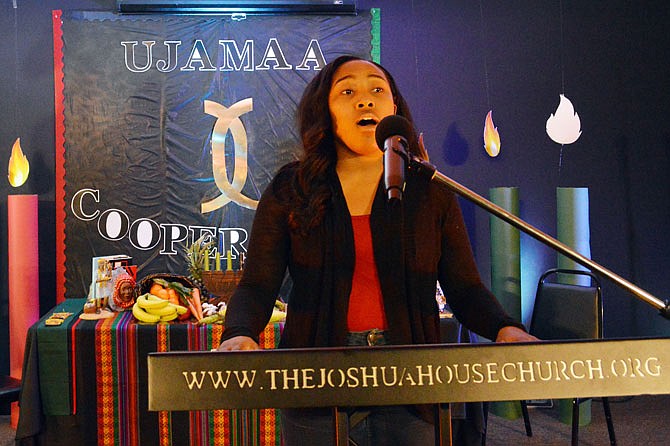The Kwanzaa holiday is typically celebrated during the last week of the year, but now a group of civic leaders in Jefferson City want to take the principals of the holiday and make them a part of the culture of the Capital City.
At the first of what are several events planned throughout the year, The Joshua House Church on East Dunklin Street hosted several speakers and performers Friday night.
Organizers said Kwanzaa isn't a religious holiday to replace Christmas and it's not celebrated exclusively by African-Americans. Rather, it teaches people to be respectful of their differences.
Kwanzaa was created in 1966 in California by Maulana Karenga, a professor of Black Studies at the California State University, now known as the father of the black arts movement and black nationalism.
Kwanzaa celebrates family, community and culture and is named after African "first harvest" celebrations. The name Kwanzaa comes from the Swahili phrase for "first fruits."
It also introduces and reinforces seven principles: unity, self-determination, collective work and responsibility, cooperative economics, purpose, creativity and faith.
A business vendor showcase was held at Friday night's celebration to focus on the cooperative economics principal of Kwanzaa
"A couple of years ago, we began to work through a Facebook page - Central Missouri Black Professionals - and we now have around 300 or more from the region on there," Joshua House Pastor Adrian Hendricks II said. "We're hoping to get more entrepreneurs in the community. We want them to realize they can't survive without community awareness."
Over the last few years, Hendricks and his wife have been working to showcase small businesses and they hope to broaden their efforts with other partners and organizations throughout this year.
"We want to do things that are healthy for community," Hendricks said. "For instance, at our next event, we plan to do a barter market. This is where we show how impoverished communities can trade for goods. You bring a jacket and I bring some shoes, and I trade you the shoes for the jacket. It's value based on what we have and what we need. This is what communities should look at where people find it difficult to have cash flow but they have things of value. Use what they have. We've never seen this done as we've looked around for ideas. It really does go back to the Indians and the Pilgrims. It's a very old concept, but we think it can still work."
Hendricks said they plan to do quarterly events this year honoring Kwanzaa principals. He is especially hopeful of putting together a city-wide baby shower for young mothers in need.

